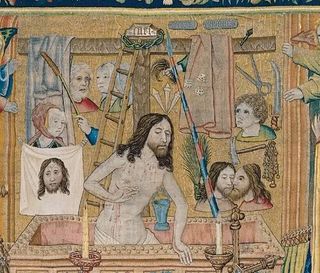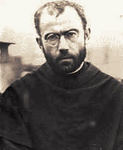Fasting

Friday After Ash Wednesday
Isaiah 58:1-9a
Psalm 50: 3-4, 5-6ab, 18-19
Matthew 9:14-15
Holy Fasting
Today the prophet Isaiah puts a question to God: “Why have we fasted, and thou seest it not? Why have we humbled ourselves, and thou takest no knowledge of it? (Is 58:3). The problem lies not in God not seeing, nor in God failing to notice. The problem lies in our fasting. The fasting pleasing to God is incompatible with quarreling, with oppression, greediness, and complacency. Holy fasting is incompatible with “the pointing of the finger, and speaking of wickedness” (Is 58:9). Saint Benedict says that we are “to love fasting” (RB 4:13). How can we begin to love fasting? How do we fast? Fasting and abstinence are, first of all, about training the will to seek the “things that are above, where Christ is seated at the right hand of God” (Col 3:1). “Set your mind on the things that are above,” says the Apostle, “not on things that are on earth” (Col 3:2).
Media Fasting
Fasting and abstinence have to do with more than food and drink. Contemporary life obliges us to look seriously at “media fasting and abstinence.” Media fasting and abstinence affect our use of television, radio, computers, internet, videos, telephone, and e-mail. Media fasting is one area in which one can be very radical without impairing one’s health. The secular media have a pernicious effect on the interior life. It happens almost imperceptibly. First we tell ourselves that television, or movies, or videos, or DVDs, or “surfing the net” is useful. Then it becomes necessary. Then it becomes a right that we are ready to defend the way a dog defends a juicy bone. This is why during Lent it is so important to practice media fasting. It opens up time in the day and in the week. It is, like all the other forms of fasting, liberating and refreshing. It refines the spiritual senses, opening the eyes and attuning the ears of the soul to “what no eye has seen, nor ear heard, nor the heart of man conceived” (1 Cor 2:9).
Contemplata Aliis Tradere


One may think it strange that I should be writing this on, of all things, a blog! Why do I continue to write Vultus Christi even during Lent? Should I not abstain from blogging? The question is a good one. This blog is an extension of my lectio divina. It is a way of reaching out to souls, a kind of sancta predicatio. Other bloggers and readers may disagree with me. “Not in bread alone doth man live,” saith the Lord, “but in every word that proceedeth from the mouth of God” (Mt 4:4). For this monk, the Dominican adage holds true even during Lent: Contemplata aliis tradere. Far be it from me to compare myself with the Servant of God Archbishop Fulton J. Sheen, but can you imagine what his blog would have been like? (I, for one, think that Archbishop Sheen would have had a blog, had the internet existed in his day. Saint Maximilian Kolbe probably would have had one too.)
Fasting in Thought and Word
Lent invites us to fast from unkind and disparaging remarks, from criticism, from sarcasm, from the so-called “white lie,” from justifying oneself, and from having to have the last word. This verbal fasting is inseparable from fasting in one’s thoughts. Fast from the thought that judges, the thought that pretends to understand another’s motives, the thought of being right, of being more clever, more spiritual, and better informed than another.
The Emptiness Within
Fasting — if we do it without cheating — leaves an emptiness within, a void that cries out to be filled. This applies to the traditional fasting from food and drink, but also to media fasting, verbal fasting, and mental fasting. Fasting alone is insufficient. One must allow emptiness created by fasting to be filled by God. In the monastic tradition whenever there is increased fasting there is a corresponding increase in the time given to lectio divina.
The Supersubstantial Bread of the Word
One who fasts without hearing the Word of God, without repeating it, praying it, and abiding with it, will feel deprived. Unless this feeling of deprivation is remedied with the supersubstantial bread that is Word of God, fasting will have a negative effect. One will become possessive and grabbing. Our fallen nature’s revenge!
The Hidden Manna
Be grateful for every opportunity to remain silent and adoring before the Eucharistic Face of Jesus. Fast, and feed on the “hidden manna” (Rev 2:17). The taste of the Bread of Angels is sweet in the mouth of one who fasts. Choose the absence of many things, and be filled with the presence of the “one thing necessary” (Lk 10:42). Fast, and seek the gaze that converted the sinful woman and transformed the heart of Peter. Seek the Face in whose light our misery appears. Seek the compassionate gaze that sees all, forgives all, and leaves no bitterness. Seek the Face whose look of mercy enfolds the world. Fast, and seek the Face of the Bridegroom Christ. “Then you shall call, and the Lord will answer; you shall cry, and he will say, ‘Here I am’” (Is 58:9).

Father, thank you for not fasting from blogging during Lent. Your daily reflections are helpful to me. God bless.
I’m with you
Boy oh boy did I ever need to read this today. Thank you, Father Mark, O.Cist..
Yes, Thank you for niether fasting from blogging or retreating into silence; our souls hunger and thirst, and you nourish us.